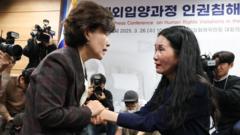The South Korean government has been accused of engaging in a systematic and deeply troubling 'mass exportation' of children for adoption, as revealed by a recent inquiry by the Truth and Reconciliation Commission. The landmark report emphasizes that from the 1950s, at least 170,000 children and infants were sent abroad without adequate oversight, a shameful chapter in South Korea’s history of human rights violations.
The commission's chairperson, Park Sun-young, highlighted that while many adoptees found loving families, an equal number suffered abuse, fraud, and trauma due to flawed processes. Families eager to adopt in Western nations received children with minimal regulations, facilitating a profit-driven scheme among private agencies. The lack of government intervention resulted in practices including falsified records, coercion, and handling adoptions without proper consent from birth mothers.
Since the inquiry began in 2022, 367 adoptees reported irregularities, leading to the acknowledgment of 56 cases that qualify as human rights violations. Reports indicate rampant fraudulent activities, including fabrications that made children appear as though they had been abandoned, thus complicating the adoptees’ efforts to trace their biological families. Many now carry false identities that hinder their legal recourse.
In a shift towards reform, South Korea's government has committed to tightening adoption practices, with a law to move overseas adoptions under government management, set to take effect by July 2023. The report's recommendations also include making an official apology and ensuring compliance with international norms surrounding adoptions.
Adoptees such as Inger-Tone Ueland Shin, who was adopted illegally to Norway at the age of 13, shared harrowing experiences that underscore the gravity of the flaws in the adoption system. She has since sought justice, attaining recognition of her plight through legal channels, yet continues to grapple with the scars of her childhood.
This unfolding investigation and its revelations not only spotlight the need for systemic change in adoption practices but also serve as a reminder of the enduring impacts on those affected by this troubling legacy. The South Korean government has yet to respond to the report, leaving many anxiously awaiting substantial change.


















